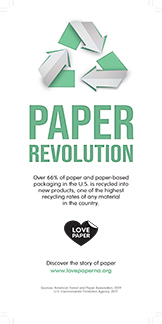In our increasingly environmentally conscious world, it's common for companies to tout their green initiatives and environmentally friendly practices, and that's just good business. But all too often, companies claim benefits - like the environmental superiority of "recyclable plastic" packaging or "going green" by switching from paper to electronic communications -- as a way to cloak poor environmental performance or mask cost-cutting efforts. With no sound scientific evidence to back them up, these types of claims are textbook greenwashing.
Some of the consequences of greenwashing are obvious. Clearly, unsubstantiated environmental claims mislead consumers, often causing them to take actions they would not otherwise consider. As reported previously by Two Sides North America (TSNA), psychological research has shown that when people see and hear unsubstantiated claims over and over again, they start to believe them as true, and ultimately incorporate them into their decision making. A 2022 TSNA study confirmed this finding. The study showed that among Americans who had repeatedly seen "go green, go paperless" and similar claims from their banks, utility companies and other services providers, 65% were influenced to switch from paper to electronic bills and statements.
Greenwashing claims can also cause reputational harm, not only damaging the credibility of companies that make such claims, but also casting doubt over the valid claims of companies that are contributing to real environmental progress. The U.S. Federal Trade Commission's "Green Guides" provide very specific guidance related to environmental claims, stating that "claims must be truthful, not misleading and supported by competent and reliable scientific evidence." Unfortunately, this guidance is often ignored.
Hidden Consequences
One of the least discussed but most damaging consequences of paper-related greenwashing is economic in nature. When respected companies, media and producers of competing materials make unsubstantiated environmental claims, they negatively influence consumers' perceptions of paper products and put at risk the livelihoods of workers across the print, paper, paper-based packaging and mail sector. A recent study by the Envelope Manufacturers Association Foundation reported that this sector accounts for 7.9 million workers who make up 5% of the U.S. workforce and contribute nearly $2 trillion to the U.S. economy. From papermakers, printers and converting equipment operators to graphic designers, paper industry suppliers and mail management and distribution employees, greenwashing creates economic vulnerabilities for many.
The Greenwashing Cure: Accountability
The way to eliminate paper-related greenwashing by corporations, media and producers of competing materials is to hold them accountable for their bogus claims. Two Sides North America is the only industry organization doing just that.
Two Sides directly challenges greenwashing companies to remove unsubstantiated environmental claims in a non-confrontational way, educating CEOs and other senior management with facts from credible, third-party sources that clearly demonstrate the unique sustainability characteristics of paper products and the solid and continually improving environmental record of the North American paper industry. So far this year, TSNA has persuaded 24 more companies and two state/provincial government agencies to remove unsubstantiated environmental claims about paper, which translates to roughly 239 million consumers who are no longer seeing anti-paper greenwashing claims from these service providers.
Two Sides also defends the sustainability of paper and paper-based packaging in the media, most recently in our letters to the Wall Street Journal, the Washington Times and Office Products International (OPI) News.
"Paper is one of the few products on earth that already has an environmentally sustainable, circular life cycle," says TSNA President Kathi Rowzie. "North American paper is made from an infinitely renewable natural resource - trees that are purpose-grown, harvested and regrown in sustainably managed forests. It's manufactured using mostly renewable, carbon neutral bioenergy in a process that uses a lot of water, but actually consumes very little of it. And paper products are recycled more than any other material in the U.S. municipal solid waste stream. But many consumers believe paper is bad for the environment because corporations, the media and other organizations they trust are telling them so. The Two Sides Anti-greenwashing Campaign is working hard to change that."
You Can Help!
If you see greenwashing claims like "go green, go paperless" from companies you do business with, or media stories promoting alternative types of packaging as environmentally superior to paper, send a pdf or jpg snip of the claims or forward the offending email to the Two Sides North America Anti-Greenwashing Campaign at info@twosidesna.org.






















